

.yale. Www.sciencedirect. Aow011. Www.cambridge. Www.cambridge. Www.amazon. Www.iep.utm. Immanuel Kant (1724-1804) is one of the most influential philosophers in the history of Western philosophy.
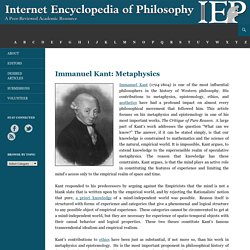
His contributions to metaphysics, epistemology, ethics, and aesthetics have had a profound impact on almost every philosophical movement that followed him. Www.britannica. En.m.wikipedia. Space, time and causality—the necessary ways in which phenomena are related to one another—do not have an existence 'outside' of us, separate from phenomena.
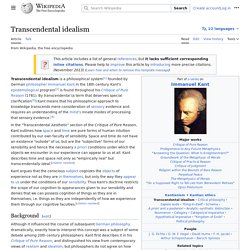
Rather, like the phenomena, these forms of interrelatedness are mind-dependent, i.e. originate in our mental faculties. Kant's doctrine is commonly presented as the notion that time, space, and causality are not independently existing entities, but constitute the necessary mental preconditions of experiencing the world. Background[edit] Although it influenced the course of subsequent German philosophy dramatically, exactly how to interpret this concept was a subject of some debate among 20th century philosophers. Plato.stanford. 1.
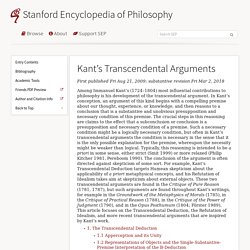
The Transcendental Deduction The Transcendental Deduction (A84–130, B116–169) is Kant’s attempt to demonstrate against empiricist psychological theory that certain a priori concepts correctly apply to objects featured in our experience. Dieter Henrich (1989) points out that Kant’s use of ‘Deduktion’ redeploys German legal vocabulary; in Holy Roman Empire Law, ‘Deduktion’ signifies an argument intended to yield a historical justification for the legitimacy of a property claim. Plato.stanford. 1.
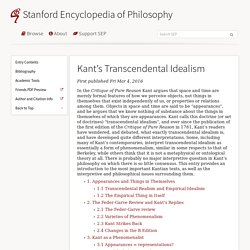
Appearances and Things in Themselves In the first edition (A) of the Critique of Pure Reason, published in 1781, Kant argues for a surprising set of claims about space, time, and objects: Space and time are merely the forms of our sensible intuition of objects. They are not beings that exist independently of our intuition (things in themselves), nor are they properties of, nor relations among, such beings. (A26, A33) The objects we intuit in space and time are appearances, not objects that exist independently of our intuition (things in themselves). In the “Fourth Paralogism” Kant defines “transcendental idealism”: Www.britannica. Plato.stanford.
1. Aims and Methods of Moral Philosophy The most basic aim of moral philosophy, and so also of the Groundwork, is, in Kant’s view, to “seek out” the foundational principle of a “metaphysics of morals,” which Kant understands as a system of a priori moral principles that apply the CI to human persons in all times and cultures. Kant pursues this project through the first two chapters of the Groundwork. He proceeds by analyzing and elucidating commonsense ideas about morality, including the ideas of a “good will” and “duty”.
The point of this first project is to come up with a precise statement of the principle or principles on which all of our ordinary moral judgments are based. Kant’s analysis of the common moral concepts of “duty” and “good will” led him to believe that we are free and autonomous as long as morality, itself, is not an illusion. Plato.stanford. 1.
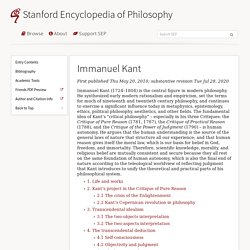
Life and works. En.m.wikipedia. Immanuel Kant (/kænt/;[1] German: [ɪˈmaːnu̯eːl kant]; 22 April 1724 – 12 February 1804) was a German philosopher who is widely considered to be a central figure of modern philosophy.
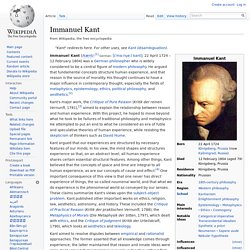
Eric-voegelin-john-locke-donald-devine. No matter how conservative intellectuals try, they just do not seem able to escape John Locke.
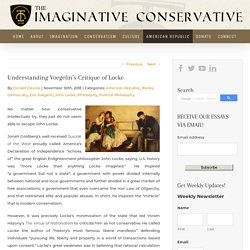
Jonah Goldberg’s well-received Suicide of the West proudly called America’s Declaration of Independence “echoes of” the great English Enlightenment philosopher John Locke, saying U.S. history was “more Locke than anything Locke imagined.” He inspired “a government but not a state”: a government with power divided internally between national and local governments and further divided in a great market of free associations; a government that even overcame the Iron Law of Oligarchy, and that restrained elite and popular abuses. Locke-values-imperatives. Plato.stanford. 1.
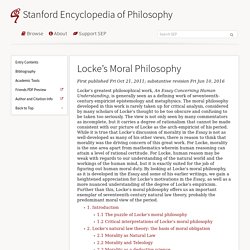
Introduction 1.1 The puzzle of Locke's moral philosophy There are two main stumbling blocks to the study of Locke's moral philosophy. The first regards the singular lack of attention the subject receives in Locke's most important and influential published works; not only did Locke never publish a work devoted to moral philosophy, but he dedicates little space to its discussion in the works he did publish. The traditional moral concept of natural law arises in Locke's Two Treatises of Government (1690) serving as a major plank in his argument regarding the basis for civil law and the protection of individual liberty, but he does not go into any detail regarding how we come to know natural law nor how we might be obligated, or even motivated, to obey it.
One might conclude, with J.B. En.m.wikipedia. John Locke FRS (/ˈlɒk/; 29 August 1632 – 28 October 1704), was an English philosopher and physician regarded as one of the most influential of Enlightenment thinkers and known as the "Father of Classical Liberalism".[1][2][3] Considered one of the first of the British empiricists, following the tradition of Sir Francis Bacon, he is equally important to social contract theory.
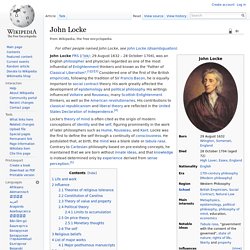
His work greatly affected the development of epistemology and political philosophy. His writings influenced Voltaire and Rousseau, many Scottish Enlightenment thinkers, as well as the American revolutionaries. His contributions to classical republicanism and liberal theory are reflected in the United States Declaration of Independence.[4] Yule - Wikipedia. Religious festival observed during the Winter season Yule or Yuletide ("Yule time" or "Yule season") is a festival historically observed by the Germanic peoples.
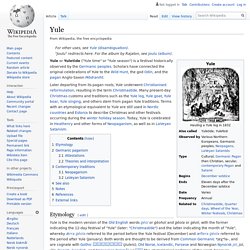
En.m.wikipedia. Ancient Roman festival in honour of the god Saturn held on December 17 and later expanded with festivities through December 23 Origins[edit] The first inhabitants of Italy were the Aborigines, whose king, Saturnus, is said to have been a man of such extraordinary justice, that no one was a slave in his reign, or had any private property, but all things were common to all, and undivided, as one estate for the use of every one; in memory of which way of life, it has been ordered that at the Saturnalia slaves should everywhere sit down with their masters at the entertainments, the rank of all being made equal. " 2nd-century AD Roman bas-relief depicting the god Saturn, in whose honor the Saturnalia was celebrated, holding a scythe Although probably the best-known Roman holiday, Saturnalia as a whole is not described from beginning to end in any single ancient source.
Modern understanding of the festival is pieced together from several accounts dealing with various aspects. Role reversal[edit] En.m.wikipedia. Biography[edit] Early life and education[edit] Jacobi was born in Minneapolis, Minnesota in 1904 and lived there throughout his life.